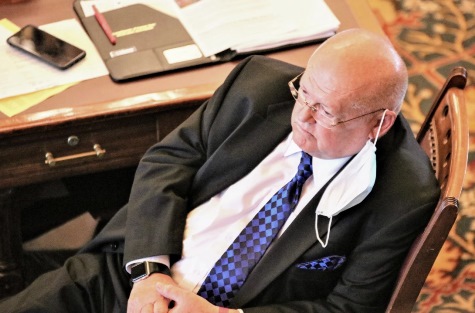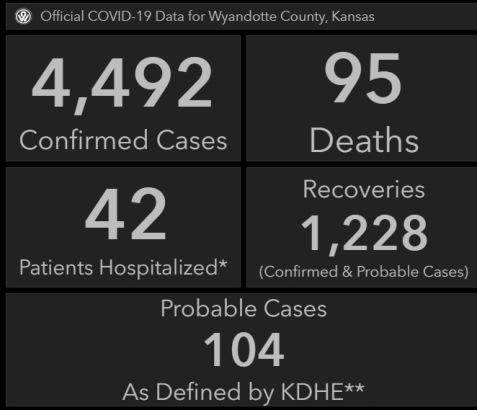
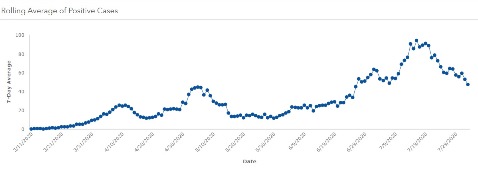
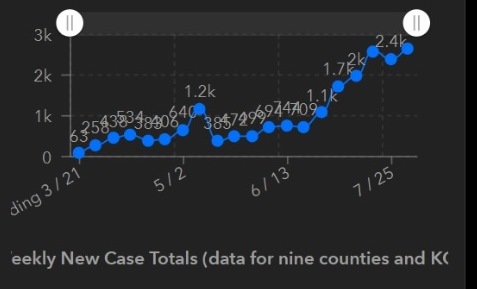
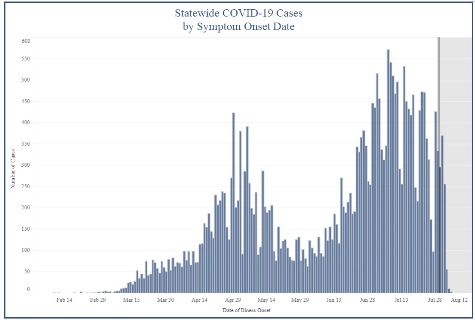
Trend is declining in Wyandotte County
COVID-19 cases are increasing in the community, according to doctors participating in a University of Kansas Health System news conference Monday morning.
The University of Kansas Health System on Monday morning reported four COVID-19 deaths over the weekend. There were 30 COVID-19 patients, including six in the intensive care unit and five on ventilators, according to Dr. Dana Hawkinson, medical director of infection control and prevention.
Overall, the number of cases is increasing in the community, according to Dr. Hawkinson.
Dr. David Wild, vice president of performance improvement for the University of Kansas Health System, said the patients are slightly younger and are staying in the hospital a shorter time, leading to more patients coming and going.
Those who end up in the ICU are generally very sick and on the ventilator, and most of them are there a longer time, he said.
This past weekend, the youngest COVID-19 patient in the hospital was 19 and the oldest was in the 80s, he added. “There are plenty of 20- and 30-year-olds in the hospital,” he said.
They are now seeing the spread of the disease in the community, and all ages are being affected, Dr. Wild said.
At Advent Health, there were 24 COVID-19 patients in the hospital today, including eight n the ICU and five on ventilators. The numbers peaked about 10 days ago at 30. The hospital is seeing the same experience with a wider range of ages, according to Dr. Larry Botts, chief medical officer.
Dr. Raghu Adiga, chief medical officer at Liberty Hospital, reported seven COVID-19 patients, with three in the ICU and ventilators. He said Clay County has seen an uptick in positive COVID-19 cases in the past couple of weeks, but not a large increase in hospitalizations.
Dr. Mark Steele, executive chief clinical officer at Truman Medical Center, said there were 22 COVID-19 patients in the hospital, down from a high of 36 a week ago, with 11 in the ICU and three on ventilators. The length of stay is down.
The hospital has seen about a third of the COVID-19 deaths in the Hispanic population, he said, and has increased its efforts to offer testing to the community.
Dr. Hawkinson said there are still a few weeks to get the community spread under control, and he hopes to see a further drop in numbers before schools reopen. He said people can reduce the spread of the disease by wearing a mask, social distancing, washing hands, staying home when sick and staying away from crowds.
Wyandotte County reported 4,492 positive COVID-19 cases on Aug. 3, according to the Unified Government COVID-19 webpage.
The Kansas City Region COVID-19 Resource Hub reported 19,945 confirmed cases and 373 deaths Sunday in a nine-county area in Greater Kansas City.
The state of Kansas reported 28,876 positive cumulative COVID-19 cases on Monday morning, an increase of 1,064 since Friday morning, according to statistics from the Kansas Department of Health and Environment. There were a cumulative total of 365 deaths, an increase of seven deaths from Friday.
The KDHE figures stated Wyandotte County increased 124 cases from Friday to Monday morning.
According to KDHE statistics, Johnson County cases increased to 5,252, an increase of 257 since Friday. Sedgwick County, the Wichita area, reported 4,506 cases on Monday morning, according to KDHE.
Free testing offered
Free COVID-19 testing is planned from 8 a.m. to 11 a.m. Tuesday, Aug. 4, at All Saints Parish, 811 Vermont Ave., Kansas City, Kansas.
The pop-up test is offered through Vibrant Health and the Health Equity Task Force.
Free testing also is offered from 9 a.m. to 3 p.m. Monday through Friday at the Unified Government Health Department parking lot at 6th and Ann, Kansas City, Kansas.
For more information on who may be tested and what to bring, visit https://wyandotte-county-covid-19-hub-unifiedgov.hub.arcgis.com/pages/what-to-do-if-you-think-you-have-covid-19.
The KU doctors’ news conference is online at https://www.facebook.com/kuhospital/videos/654931088754776.
The Wyandotte County school start order is online at https://alpha.wycokck.org/Coronavirus-COVID-19-Information.
Wyandotte County is under a mandatory mask order and is in Phase 3 of the state’s reopening plan. For more information, residents may visit the UG COVID-19 website at https://alpha.wycokck.org/Coronavirus-COVID-19-Information or call 311 for more information
The CDC’s COVID-19 web page is at https://www.cdc.gov/coronavirus/2019-nCoV/index.html.

